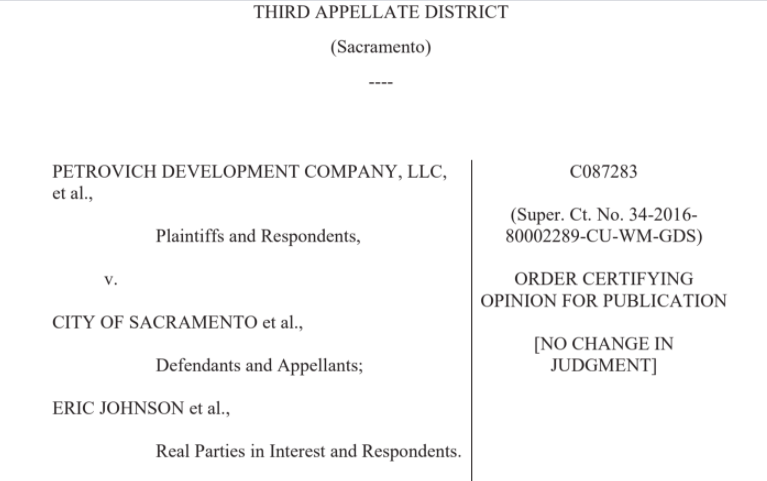
Crocker Village, Sacramento. (Photo: Petrovich Development)
Sacramento Developer’s Unprecedented Lawsuit Against City Council for Brown Act Violations is Published
Three California courts and a unanimous appellate court ruled that the Sacto Council violated the Constitutional rights of developer
By Katy Grimes, May 11, 2020 2:02 am
In a rare act, the California Third District Court of Appeals felt so strongly that Sacramento City Councilman Jay Schenirer had egregiously broken the law, violated the 14th Amendment right to a fair trial of Sacramento developer Paul Petrovich, and concluded the Brown Act had been violated, they decided to publish the decision.

This decision came down after five years and almost $2 million in legal costs by Petrovich having to relentlessly pursue what he suspected the entire time: He said he knew his civil rights had been violated and that Schenirer had broken the law, and the Brown Act, but he had to prove it.
What was Petrovich’s crime? Turning a nasty old polluted railyard into a 72-acre development of Brownstone homes, senior living, upscale shopping, and all of it close to transit and a nearby community college.
Petrovich Petrovich has worked since 2003 – more than 17 years – and invested more than $150 million in his 72-acre Crocker Village development project, an infill development. The local neighborhood association and Councilman Schenirer attempted to prevent a gas station from going in.
It took more than 20 Superior Court battles to unearth evidence after most of it had been illegally destroyed, which showed some coordination between Schenirer, other city council members, council staff, the neighborhood association, and former Mayor Kevin Johnson, that the Court of Appeals connected the dots and put the hammer down on the City and especially Councilman Schenirer.
There is now precedent under Petrovich Development Company vs. the City of Sacramento that outlines in great detail when Councilman Schenirer crossed the line, broke the law, violated Petrovich’s civil rights to a fair trial, as well as how he coached and scripted the leaders of a notoriously radical neighborhood association, of which he was a long-time member, and scripted point-by-point the talking points for this group to use when speaking to other City Council members on why they should vote against the project which is a punishable crime under the Brown Act.
The 18-page ruling clearly describes that Councilman Schenirer became an advocate in a matter in which he was expected to act as an impartial judge.
The evidence includes a script distributed by former Mayor Kevin Johnson’s staff, apparently under the Mayor’s direction to the entire council the night before the hearing. The script detailed the motion Schenirer would make, which would deny Petrovich what the Planning Commission had already approved. The scheme was that Councilman Steve Hanson would second the motion, and outlined what Mayor Johnson would say.
The Superior Court reversed the City Council’s decision and ordered the council to give Petrovich a new fair hearing, and that Schenirer was to recuse himself. However, instead of giving Petrovich the ordered hearing without Councilman Schenirer within 60 days, the City quickly filed an expensive appeal that consumed yet another two years of legal time and expenses for Petrovich and city taxpayers. The City of Sacramento is estimated to have spent approximately $2 million in legal fees, in addition to the City recently adding a second private law firm to the team to assist with litigation.
This Third District Court of Appeals decision enshrines it as the law of the land and establishes precedent for the entire state of California.
What Happened?
In April, California Globe reported “Three California courts and a unanimous appellate court have ruled that the Sacramento City Council violated the constitutional rights of Sacramento developer Paul Petrovich over his request for a special permit for a 16-pump gas station next to a new Safeway store, opened just last year in Sacramento’s Curtis Park neighborhood.”

However, despite modifying plans, making concessions, and compromising with city planners and local residents, Petrovich was met with vitriol, collusion and devious city shenanigans, along with an unsurprising case of NIMBYs – “not in my backyard” – people who reliably object to any change in the neighborhoods where they live.
Five years ago the Sacramento City Council denied Petrovich a fair hearing when he applied to build a gas station next to a the Safeway store in his Crocker Village development. Petrovich proved at the time that his deal with Safeway would fizzle unless the gas station was allowed.
The appellate court’s April decision connected the dots and concluded the script developed by Councilman Schenirer was circulated and explicitly describes how and when Schenirer crossed the line as an advocate for the Sierra Curtis Neighborhood Association (the appellant) while he was sitting as a judge on the matter and no longer was an unbiased adjudicator.
Despite that the Sacramento City Planning Commission had already granted Petrovich a conditional use permit for the gas station, the Sierra Curtis Neighborhood Association, which opposed the gas station, appealed to the City Council. The NIMBYs in Curtis Park claimed the grocery store and gas station presents cancer risks.
The Third District Court of Appeals Decision
The court explains its decision:
In this appeal we consider the restraints imposed on city council members, who are normally policymakers and voices of their constituents, when they act in a quasijudicial capacity as adjudicators of matters on appeal from an administrative body. Here, the Sacramento City Council (City Council) was called upon to act in such a capacity following an eight-to-three vote by the Sacramento Planning and Design Commission (Planning Commission) granting a conditional use permit for a gas station in the shopping center zone of a local residential development.
Real parties in interest appealed the decision to the City Council.1 In such matters council members must be neutral and unbiased. The developers sued, asserting in the trial court that one City Council member was neither and entered deliberations on the issue with his mind already made up.2 The trial court agreed and, upon review of the record, so do we. Accordingly, we affirm the order granting the petition for writ of mandate and ordering the city to rescind the decision on the appeal and hold a new hearing on the appeal at which the councilmember would be recused from participating.
and:
Councilmember Schenirer acted as advocate, not a neutral and impartial decisionmaker, and should have recused himself from voting on the appeal. Because he did not, Petrovich did not receive a fair hearing.
By concluding that Councilman Schenirer did indeed do this, the Brown Act provides for punishment:
CIVIL REMEDIES:
Individuals or the district attorney may file civil lawsuits for 54960; Ch. VII injunctive, mandatory or declaratory relief, or to void action 54960.1 taken in violation of the Act.
Attorneys’ fees are available to prevailing plaintiffs. 54960.5
CRIMINAL SANCTIONS:
The district attorney may seek misdemeanor penalties against 54959 Ch. VII a member of a body who attends a meeting where action is taken in violation of the Act, and where the member intended to deprive the public of information which the member knew or has reason to know the public was entitled to receive.
However, some are concerned that Sacramento Mayor Darrell Steinberg may be trying to convince other council members to indemnify Schenirer for his unlawful and criminal acts.
In an interview with Petrovich, he said he intends to continue the investigation through a separate lawsuit he filed for damages where he can actually conduct discovery. The Writ to overturn the Council’s decision did not allow discovery – only compilation of transcripts and some internal communications accumulated under the Public Records Act.
Under the Tort, the City tried multiple times to have the case dismissed but has failed as the Superior Court allowed four of the six allegations to move forward, which includes holding Councilman Schenirer and former Mayor Kevin Johnson personally liable.
The city will be subject to discovery through depositions and mirror imaging computers that have been required under the Writ hearings to be preserved.
“Each and every councilperson and staff member who received this unlawful script and participated in unlawful behavior will be held personally liable and to the fullest extent of the law including the Brown Act violations,” said Petrovich. “They were in the car as the crime was committed with Schenirer driving and Johnson riding in the front passenger seat with his group of votes he controlled. They are all just as culpable. The others should have brought this unlawful behavior to the City Attorney’s attention just as we as citizens are supposed to report crimes when we witness them.”
“Only council members Allen Warren and Larry Carr would not go along with the commitment of this civil rights violation and their oath of office,” Petrovich added. “People need to understand those culpable are not ignorant of what is lawful or not. They are extensively trained after being elected to not do what they did here. There was no ignorance and it certainly is not a defense. In this case, as elected officials, they have an increased burden to represent all of us fairly. ”
Letters in support to publish this case and make it law and stand as the precedent came from numerous groups who believe this sort of behind closed doors behavior is rampant. In particular were the Black and Hispanic State Chambers of Commerce. Ironically, the bulk of Schenirer’s district is made up of African American and Hispanic residents.
The project had a written commitment to hire all 200 union jobs for Safeway from Oak Park, the most impoverished community in the City of Sacramento, located in Schenirer’s district.
What’s Next for Petrovich?
Because the court determined that it is clear Schenirer’s script was circulated, now it’s a matter of determining under discovery laws and depositions who also was part of the collusion.
Lastly, it’s no big secret that Mayor Darrell Steinberg has his eye on a judgeship, yet many say he should not have his ambitions granted as he seeks to get the council to indemnify Schenirer, who has now been proven by the Third District Court of Appeals of violating Petrovich’s civil rights.
This case will stand in perpetuity and be referenced in every court matter involving civil rights and Brown Act violations statewide.
For the entire story, read Part l: “CA Appellate Court Unanimously Rules Sacramento City Council Violated Local Developer’s Constitutional Rights,” where the details of the crimes against Petrovich are explained in detail.
This article gives background on Petrovich’s case and experience with the City Council.
- California Lawmaker Making the State More Hostile to Business - April 18, 2024
- California Democrats’ Backdoor Reparations Scheme - April 17, 2024
- California’s Senate Democrats Reject Bill to Make Purchasing a Child for Sex a Felony - April 16, 2024





Another great article exposing the illegal activities in city hall. I wonder why I never saw mention of this in the Bee?
Outstanding Katy, thank you for your work.